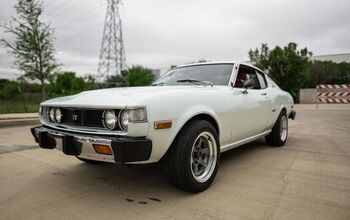Takata to Plead Guilty, Will Issue $1 Billion in Restitution for Deadly Airbags

Automotive parts supplier Takata Corp, along with three of its former employees, were charged by federal prosecutors with concealing the deadly defect of its airbag inflators.
The devices have been subject to an unprecedentedly massive recall and have have been linked to at least 11 fatalities in the United States. Takata has agreed to plead guilty to the charges against it and will pay $1 billion in restitution.
Of the billion dollar penalty, $850 million is set aside for automakers that purchased the inflators, while $125 million will go toward the individuals injured by the defective products. The remaining money will serve as a general criminal fine.
The federal grand jury also indicted former Takata employees. Filed in early December and unsealed today, the indictment alleges the three workers falsified and doctored reports to mask test results that would have shown that the inflators were dangerously faulty. The three men — Shinichi Tanaka, Hideo Nakajima and Tsuneo Chikaraishi — have been charged with six counts of conspiracy to commit wire fraud, and wire fraud.
“Automotive suppliers who sell products that are supposed to protect consumers from injury or death must put safety ahead of profits,” U.S. Attorney Barbara L. McQuade said in an official statement to the press. “If they choose instead to engage in fraud, we will hold accountable the individuals and business entities who are responsible.”
Takata’s airbags differ from others in that the inflators use an ammonium nitrate propellant to quickly fill the crash bags. However, the chemical can become unstable over time, expand too quickly, and blow apart the metal canister. Prosecutors said that the company was aware that its inflators were not performing to industry specifications as early as 2000, but sold them to automakers anyway. The parts supplier even encouraged customers to purchase systems by submitting fraudulent reports that concealed the failures and ruptures during testing, prosecutors said.
The U.S. has ordered Takata to recall all of its faulty air bags by the end of 2019. The matter is being conducted in a way that prioritizes higher-risk cars sold in states with elevated temperatures and humidity. Roughly 46 million airbags in over 29 million vehicles have been recalled since December 2016. Another 25 million additional units are set to be recalled over the next two years.
As for the criminal fine, payments to the individual victims will begin immediately. Money allocated to automakers must be paid within five days of Takata’s anticipated sale or merger — one of which is anticipated to occur within the year.
The company has also been fined $70 million by U.S. safety regulators for its slow handling of the recall. There could also be an additional $130 million fine leveled from the National Highway Traffic Safety Administration, but only if Takata can’t fulfill the terms of a consent order agreed to in November of 2015.
Considering the overwhelming costs involved with the recall and legal expenses, financial analysts fully expect Takata’s U.S. operations — located in the Auburn Hills, Michigan — to seek bankruptcy protection.
[Image: Takata]

A staunch consumer advocate tracking industry trends and regulation. Before joining TTAC, Matt spent a decade working for marketing and research firms based in NYC. Clients included several of the world’s largest automakers, global tire brands, and aftermarket part suppliers. Dissatisfied with the corporate world and resentful of having to wear suits everyday, he pivoted to writing about cars. Since then, that man has become an ardent supporter of the right-to-repair movement, been interviewed on the auto industry by national radio broadcasts, driven more rental cars than anyone ever should, participated in amateur rallying events, and received the requisite minimum training as sanctioned by the SCCA. Handy with a wrench, Matt grew up surrounded by Detroit auto workers and managed to get a pizza delivery job before he was legally eligible. He later found himself driving box trucks through Manhattan, guaranteeing future sympathy for actual truckers. He continues to conduct research pertaining to the automotive sector as an independent contractor and has since moved back to his native Michigan, closer to where the cars are born. A contrarian, Matt claims to prefer understeer — stating that front and all-wheel drive vehicles cater best to his driving style.
More by Matt Posky
Latest Car Reviews
Read moreLatest Product Reviews
Read moreRecent Comments
- SCE to AUX Over the last 15 years and half a dozen vehicles, my Hyundais and Kias have been pretty cheap to maintain and insure - gas, hybrid, and electric.I hate buying tires - whose cost goes by diameter - and I'm dreading the purchase of new 19s for the Santa Fe.I also have an 08 Rabbit in my fleet, which is not cheap to fix.But I do my own wrenching, so that's the biggest factor.
- MaintenanceCosts '19 Chevy Bolt: Next to nothing. A 12v battery and a couple cabin air filters. $400 over five years.'16 Highlander Hybrid, bought in 2019: A new set of brakes at all four corners, a new PCV valve, several oil changes, and two new 12v batteries (to be fair, the second one wasn't the car's fault - I had the misfortune of leaving it for a month with both third-row interior lights stealthily turned on by my kid). Total costs around $2500 over five years. Coming due: tires.'11 BMW 335i, bought in late 2022: A new HID low beam bulb (requiring removal of the front fascia, which I paid to have done), a new set of spark plugs, replacements for several flaking soft-touch parts, and two oil changes. Total costs around $1600 over a year and a half. Coming due: front main seal (slow leak).'95 Acura Legend, bought in 2015: Almost complete steering and suspension overhauls, timing belt and water pump, new rear brakes, new wheels and tires, new radiator, new coolant hoses throughout, new valve cover gaskets, new PS hoses, new EGR valve assembly, new power antenna, professional paint correction, and quite a few oil changes. Total costs around $12k over nine years. Coming due: timing belt (again), front diff seal.
- SCE to AUX Given this choice - I'd take the Honda Civic Sport Hatchback (CVT). I 'built' mine for $28777.To my eye, the Civic beats the Corolla on looks these days.But for the same money, I can get an Elantra N-Line with 7-speed DCT, 201 HP, and good fuel economy, so I'd rather go for that.
- Kwik_Shift_Pro4X '19 Frontier Pro 4X. Next to nothing. All oil changes are on schedule. Got new tires at 60000 miles. Still on original brakes at 79000 miles. Those are due soon. Brakes complete estimate $1000 all in.
- Dr.Nick The cars seem really expensive with tight back seats and Cadillac was on the list of the highest price gouging dealers coming out of COVID. I don’t understand the combination, shouldn’t they be offering deals if they are not selling?































Comments
Join the conversation
Why is the Takata logo the state of Utah?
I wish I had more details on the execs who made out like bandits at Takata before bailing with their golden parachute. I'm sure there were more than three people involved in this cover up. I would also like to know if these three employees (who I'm guessing reside in Japan) will be extradited to face justice. My guess is no but that's just me being cynical after witnessing years of corporate malfeasance without ever being held accountable for screwing over countless consumers.